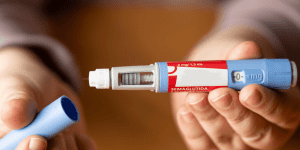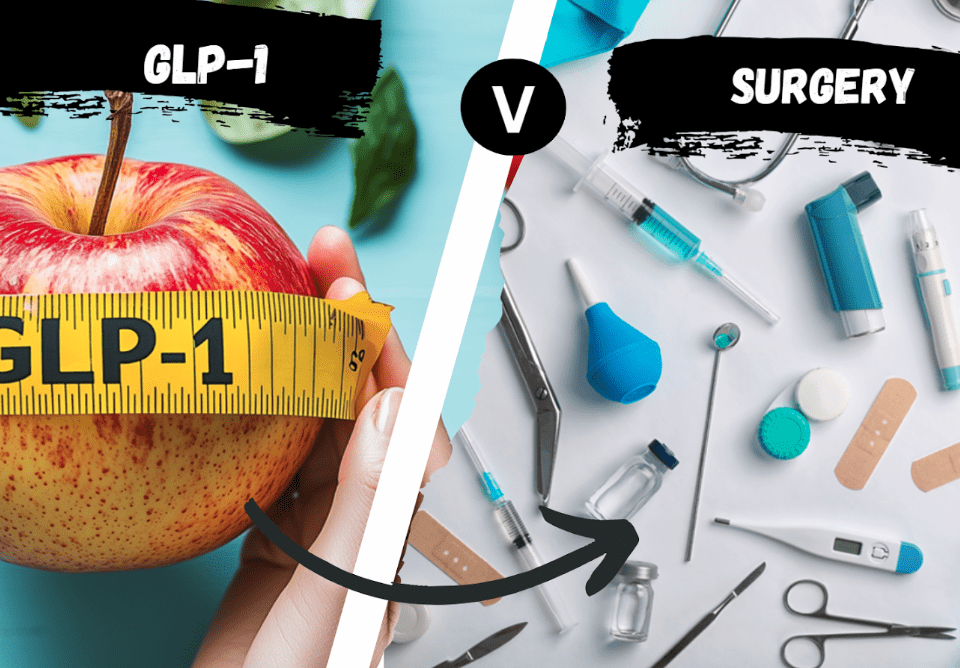
After trying every diet and ‘quick fix’ in the book, you’ve made the brave, life-changing decision to take control of your health through bariatric surgery.
This isn’t just another diet; it’s a long-term commitment to transforming your relationship with food, movement, and overall wellbeing.
At The Winnett Specialist Group, we’ve developed a structured six-week countdown to help you get ready for bariatric surgery with confidence. Guided by Bariatric Surgeon Dr Jason Winnett and our multidisciplinary team of doctors, dietitians, and psychologists, this step-by-step guide ensures you’re fully equipped for surgery (and for the healthier life that follows).
Week 1: Meet your Bariatric Surgeon
Don’t forget to bring your GP referral to your first consultation. In Australia, referrals to specialist doctors are valid for twelve months from the date you see the specialist (not the date the GP issued it).
At Winnett Specialist Group, you’ll meet Dr Jason Winnett, a highly experienced bariatric surgeon with over 24 years of expertise helping people achieve lasting weight loss and improved health.
He sees patients across Melbourne, in locations including Sydenham, Williamstown, Werribee, and East Melbourne.
During your meeting with Dr Winnett, you’ll discuss your individual goals and questions.
A healthy approach tailored to your goals
Perhaps you’re a 32-year-old woman who has battled weight issues for much of your adult life and you’re trying to have a baby? One study published in a 2014 issue of the Fertility and Sterility Journal (2014) reveals that women who lose just 10% of their body weight can increase conception rates from 54% to 88%*1.
Or maybe you’re a 54-year-old menopausal woman and you’re worried about the 8% increased risk of breast cancer with every five extra kilograms of weight*2 reported in a Science Direct study of thousands of women.
Whatever your situation, your first consultation will help determine whether bariatric surgery is the right option for you. Not everyone is a candidate for surgery, and this initial assessment ensures any recommendations are safe, appropriate, and tailored to your health needs.
If you are a suitable candidate, you’ll learn that bariatric surgery is not only about losing weight—it’s about improving your health and laying the foundation for a healthier life.
Week 2: Attend your tests and dietitian consultation
During your first consultation, Dr Winnett will order a panel of pre-surgical tests for all patients.
Complete blood count (CBC)
This includes full blood examination, electrolyte levels, renal and liver function, and all vitamin levels.
‘This helps identify issues that need to be flagged,’ says Dr Winnett. ‘For instance, anemia is common in people with obesity and ideally should be corrected before surgery to prevent complications during and after the procedure.’
Cardiovascular and pulmonary tests
Dr Winnett says, ‘Winnett Specialist Group has an onsite general physician who will perform an echocardiogram (ECG), and may also refer more complex cases to a cardiologist. This testing helps us evaluate how your cardiovascular system responds to physical activity and anesthesia.
‘We also conduct respiratory function tests and, where needed, sleep studies to investigate for sleep apnoea.’
Gastroscopy
‘A gastroscopy or upper endoscopy (EGD) will be performed to detect ulcers, polyps, or gastroesophageal reflux disease (GERD),’ says Dr Winnett. ‘This is especially important as some surgeries, such as gastric sleeve surgery, may worsen reflux symptoms*3, while gastric bypass can improve them.’
If we identify a hiatus hernia during the process, it can be repaired at the same time as your bariatric surgery.
Additional medical testing
Dr Winnett says, ‘Some patients with complex issues such as diabetes may also be referred to an endocrinologist for review, while patients with depression, anxiety or compulsive eating issues may be referred to a psychologist or psychiatrist.
‘A sleep apnoea test may also be recommended to monitor breathing and oxygen levels overnight, with results allowing our anaesthetists to adjust care accordingly.’
Dietitian consultation
Bariatric surgery patients receive two one-hour consultations with our on-site dietitian—one before surgery and one after.
During your pre-surgery session, the dietitian will guide you through a tailored nutrition plan, typically focusing on high-protein, low-carbohydrate meals and clear hydration goals to help you prepare for surgery and recovery.
Dr Winnett says, ‘This very-low-calorie diet (VLCD) starting in the lead-up to surgery helps to shrink the liver, making it easier for the surgeon to navigate the important anatomy. This preparation also helps blood sugar control before surgery, while also establishing healthy eating habits for the long term.’
Patients will also be put on a daily multivitamin regimen, which must be adapted long-term after surgery. ‘After surgery, your body doesn’t absorb nutrients from food the same way it used to.’ These changes can cause deficiencies in iron, Vitamin B12, calcium, thiamine, Vitamin A, and Vitamin D.
On your way to better health
Dr Winnett says, ‘It’s not uncommon to feel a bit like a human guinea pig with all this pre-surgery, blood tests, questioning and medical supervision. However, most patients are ultimately relieved because they know it’s a big step towards wellness.
‘And with tests completed and medical clearance secured, patients feel medically prepared for the surgery ahead. It also alerts them if any medical issues require further investigation, such as anemia or vitamin deficiencies, which are common in this cohort.
‘Through this process, patients also learn to be confident about undergoing a bariatric procedure, which nowadays has a similar safety profile to an orthopaedic procedure like a hip or knee replacement.’
Week 3: Start gentle exercise and build healthy habits
Both research and clinical evidence show that even modest physical activity before surgery can make a measurable difference in long-term surgical outcomes.
In one study, patients who expended just 1,500 kcal per week through light exercise*4 before bariatric surgery achieved significantly greater weight loss 12 months after surgery compared to those who remained sedentary.
Movement also improves circulation, strengthens your heart and lungs, and helps reduce surgical risks such as blood clots. It also helps your body use energy more efficiently, enhances mood, and builds confidence ahead of surgery.
Dr Winnett reminds patients that ‘surgery works best when your body is already learning to move again.’
Even 10-15 minutes of low-impact exercise can boost energy levels and prepare your muscles and joints for the healing process after surgery.
A few exercise ideas
- Walking: Begin with slow walks, 5-10 minutes a day, 3-4 times per week. Gradually increase the duration and pace as you feel stronger.
- Chair or water exercises: If you have knee, hip, or back discomfort, try seated leg lifts or water-based activities to reduce joint pressure.
- Stretching or yoga: Gentle stretching improves flexibility and body awareness, helping relieve pre-surgery tension.
- Light resistance: Use light hand weights or resistance bands 2-3 times a week to build muscle tone and support metabolism.
- Daily tracking: Note your activity minutes, steps, or distance. Weigh yourself once a week and record your progress. Focus on consistency, not perfection.
These gradual movements strengthen your cardiovascular system, support circulation, and may reduce liver fat, making the surgical procedure safer and more efficient.

Week 4: Refine your very-low-calorie diet (VLCD)
During your VLCD remember:
- Hydration first: Sip fluids slowly throughout the day. Avoid gulping or drinking large volumes at once.
- No fluids with meals: Wait approximately 30 minutes after eating solid or semi-solid items before resuming drink intake.
- Prioritise protein: Each meal/snack should be built around a lean protein (e.g., whey supplement, egg whites, puréed lean meat) to hit the pre-surgery target and protect your muscles.
- Foods to avoid: Get used to steering clear of high-fat meats, fried or fast foods, snacks like chips, and carbonated or sugary drinks. These can interfere with recovery after surgery and increase your risk of nausea or ‘dumping’ (when food moves too quickly through the digestive system, causing discomfort).
Week 5: Be mindful every now and zen
In the lead-up to surgery, it’s important to get your mind on board by using mindfulness to help you prepare for the road ahead.
Psychologist Georgie Beames says, ‘Mindfulness is about slowing down, noticing your body’s signals, and being fully present during meals. It helps patients tell the difference between emotional and physical hunger, breaking that automatic cycle of stress-eating and guilt.’
Recent research has confirmed what clinicians like Georgie have observed for years. A 2024 study in Nature*5 found that ‘mindfulness meditation modulates stress-eating’, demonstrating significant changes in the hypothalamus, reward regions, and insula – areas of the brain linked to hunger and emotion.
Our mindfulness tips
- Eat deliberately and without distraction. No screens, no phones. Just focus on your food and your body’s cues.
- Engage all your senses. Notice the colour, texture, aroma, and temperature of your meal. Identify flavours and ingredients as you chew.
- Chew each bite 20 times. Put your fork down between bites and give your brain time to register fullness.
- Rate your hunger and fullness. Begin eating when hunger is around a 4/10 and stop when you’re comfortably satisfied at 6–7/10. Look for subtle fullness cues, like tightness in the sternum or hiccups.
- Recognise emotional vs physical hunger. Emotional hunger feels urgent and specific, often leading to cravings for sugary or fatty foods and guilt after eating.
- Be grateful. Begin and end meals with a brief moment of gratitude, acknowledging where your food came from and how it nourishes you.
Week 6 – part 1: Attend your pre-surgical assessment
By this period, your test results should have been returned. Dr Winnett will review these results with you. He will organise surgical consent, go through all the side effects and risks of surgery, and discuss financial options for surgery.
He will also look at any required medication and lifestyle adjustments before surgery.
‘You do not, for instance, need to stop your weight-loss (GLP-1) medication before surgery or after surgery,’ Dr Winnett says.
‘However, there are some specific pre-operative precautions to minimise risk during anaesthesia relating to these medications. These include following a clear-fluid diet for a strict 24-hour period and fasting from all fluids and solids for 6 hours before surgery.’
‘This helps reduce the risk of retained gastric contents, which can lead to complications such as aspiration during sedation or general anaesthesia.’
Smoking must be ceased at least a few weeks before surgery. Warfarin, blood thinners, and fish oil should be stopped 10 days before surgery, to mitigate the chances of excess bleeding during surgery.
Dr Winnett says, ‘It is important in this consult to discuss any over-the-counter, prescription, or herbal medicines, to ensure that they are managed correctly.’

Week 6 – part 2: Prepare for your hospital stay and post-surgery
Before you leave for the hospital
- Double-check your surgery date, admission time, and any pre-admission paperwork or online registration required by your hospital.
- Make sure your GP and surgeon’s teams have shared all necessary reports, test results, and clearances.
- Confirm post-surgery arrangements and follow-up appointments.
- Follow all fasting instructions before any surgery involving anaesthetics; this means no food or water by mouth for at least 8 hours before the procedure.
- Have someone available to take you home. You will not be able to drive for at least 24 hours after the surgery due to the sedatives.
Pack carefully
Planning can make your hospital stay smoother and more comfortable. Make sure to pack:
-
- Essential documents: ID, insurance card, hospital paperwork, and your medication list
- Comfort items: loose-fitting clothes, slippers, lip balm, and a light robe
- Hygiene items: toothbrush, hairbrush, deodorant, and face wipes
- Entertainment and support: device chargers, headphones, a book, and/or your favourite playlist for relaxation
- A small notebook: for tracking your thoughts or notes from the care team
- Keep your bag simple and easy to carry
To maximise your recovery
- Arrange for someone to assist with everyday tasks (like cooking, cleaning, shopping, and laundry) after your return home.
- Place all items you require or use frequently within reach, as your mobility will be limited immediately after surgery.
- Take care to remove or tape down tripping hazards, like carpets and cords.
- Make sure you have a stable chair with a firm seat cushion, a firm back, and arms for adequate seated support.
- Give yourself extra time to get out of your chair. Don’t wait until the last minute to do things like go to the toilet. Racing to get up increases your risk of a fall.
You’re nearly there!
Remember, in the days leading up to your operation, it’s normal to feel both excitement and nervousness.
Psychologist Georgie Beames often reminds patients that ‘the calm you create before surgery becomes the strength you carry after it.’ A few minutes of mindfulness each day helps steady your mind and prepare your body for recovery.
As you finalise your hospital checklist, take a moment to consider your weight-loss journey and reflect on how far you’ve come.
Six weeks ago, you began on this path with many questions.
Now you stand ready with knowledge, purpose, and a plan to be healthier.
No matter where you are in your weight-loss journey, contact The Winnett Specialist Group to learn how we can support you.

P (03) 9417 1555 admin@winnettspecialistgroup.com.au
www.winnettspecialistgroup.com.au
Queens Terrace, 382 Victoria Parade, East Melbourne 3002
Sources
4 The Importance of Pre and Postoperative Physical Activity Counseling in Bariatric Surgery
5 Mindfulness meditation modulates stress-eating and its neural correlates



